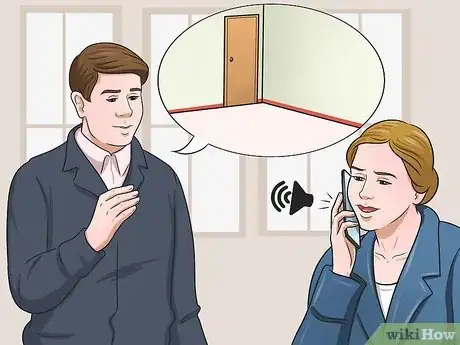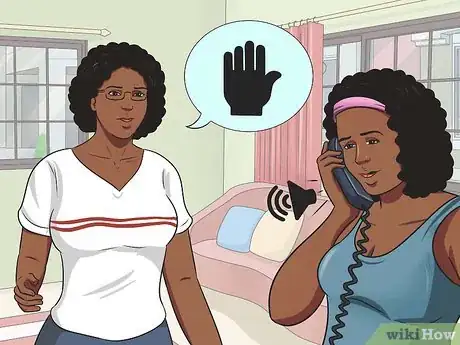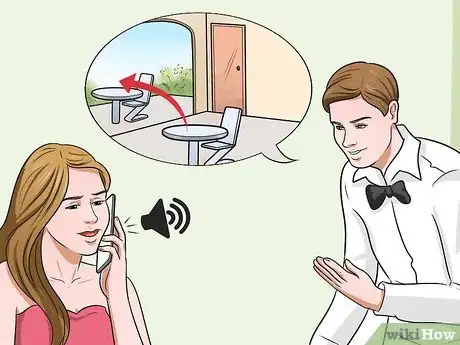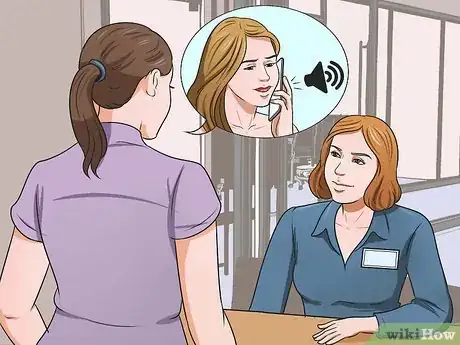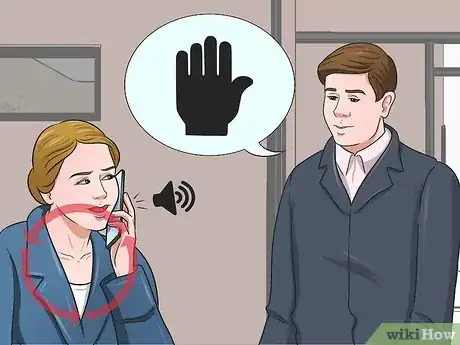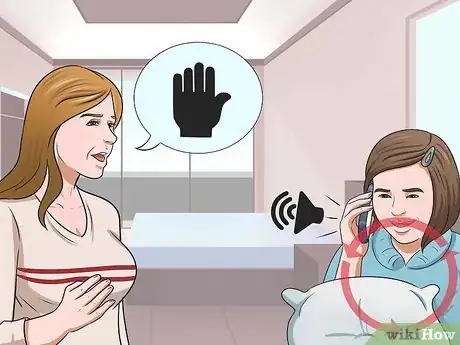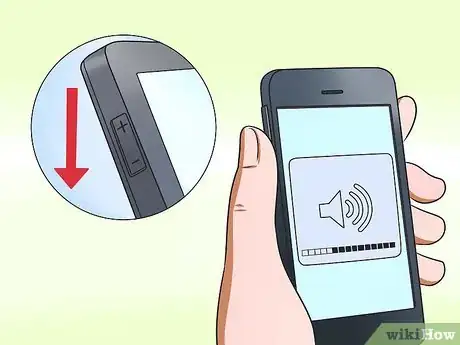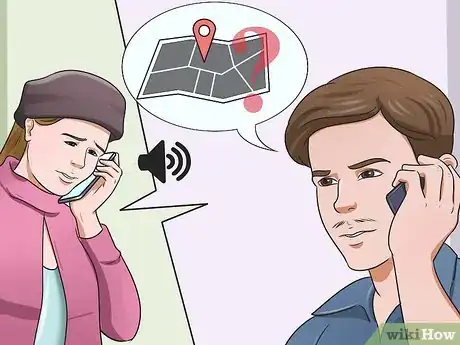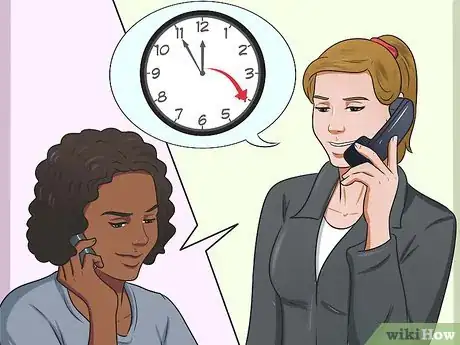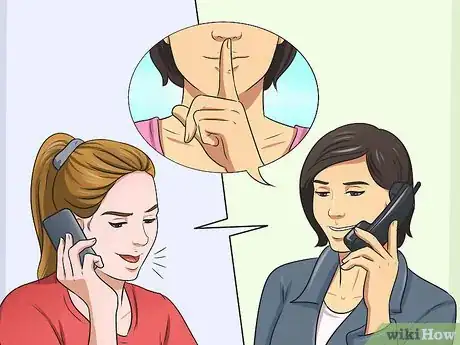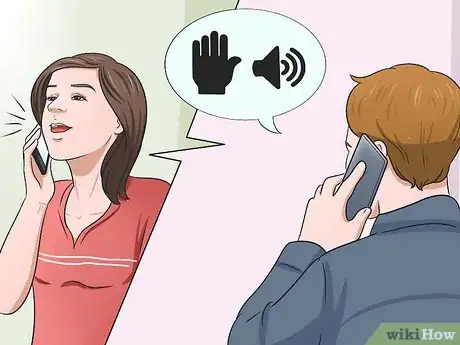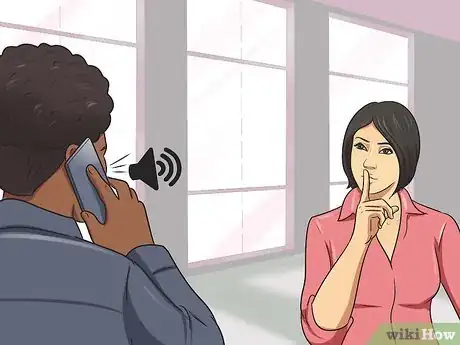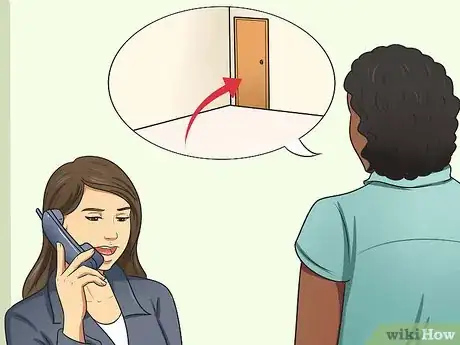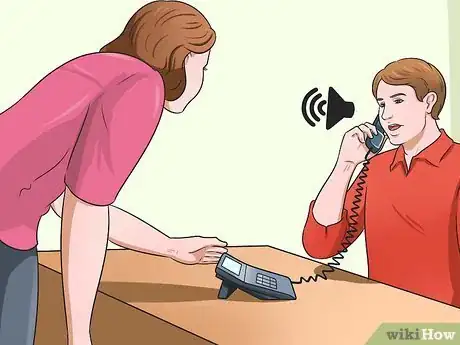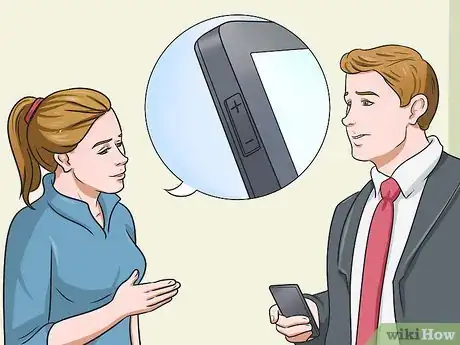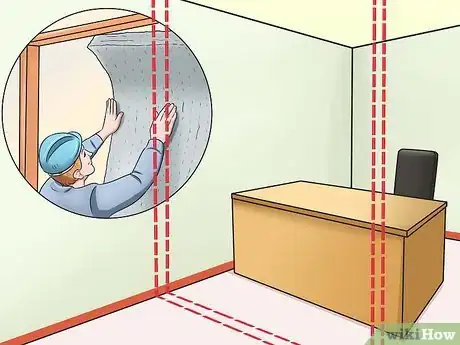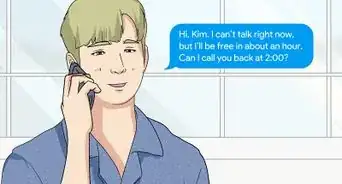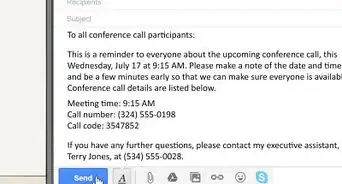X
This article was co-authored by wikiHow Staff. Our trained team of editors and researchers validate articles for accuracy and comprehensiveness. wikiHow's Content Management Team carefully monitors the work from our editorial staff to ensure that each article is backed by trusted research and meets our high quality standards.
This article has been viewed 47,326 times.
Learn more...
Being disturbed by someone talking loudly on their phone is unpleasant—be it a landline or cell phone. This can happen during a conversation near you or with a caller on the other end of the line. There are some techniques you can try to get a caller to quiet down.[1]
Steps
Method 1
Method 1 of 3:
Handling a Loud Conversation Around You
-
1Isolate the loud talker. This will allow you to address the behavior without embarrassing the caller or making a scene in public. See if you can take the caller aside to a secluded corner, office, or wall. Address them formally, and be as polite as possible.[2]
- Ask the caller something to the effect of, "Sir/ma'am, can you talk a bit lower? Your voice is carrying." Most of the time this should be enough.
- You may be dealing with a more stubborn individual or even a hostile one if asked to quiet down. In this case you want to avoid a confrontation and should not press the matter with the isolation step.
-
2Ask the caller to stop directly. This risks a confrontation with the loud caller. Attempt something subtle at first such as making eye contact, throat clearing, head shaking, or hand waving. The caller’s reaction could vary from compliance, to ignoring you, to hostility. You can try insisting if you are ignored, but this increases the risk of a hostile reaction. You might be better off moving to another location yourself or giving the other steps another try.
- If subtle gestures don’t work, then tell the person directly something similar to: "Sir/ma'am, can you please talk a bit lower on your phone?"
Advertisement -
3Offer an alternative. Sometimes simply asking someone to talk more quietly isn't enough, but if you ask the caller to take the conversation elsewhere, then you can give the caller a way out. If you're in a public space with alternative rooms like a movie theater with a lobby or doctor's office with a coat room--then suggest the loud caller move there. You can also offer alternative timing. This is a bit easier if it's a person you know talking loudly that is more willing to wait at your insistence, but it could work on a stranger. You can also try striking up a different conversation with the caller.[3]
- For example you could say: "Sir/ma'am, I couldn't help but overhear your conversation, could you please take it into the lobby?"
- You also could ask something to the effect of: "Sir/ma'am, could you wait until after the movie is over to continue your conversation?" or "Perhaps that can wait until after dinner?"
- If you are in a restaurant you might try interrupting the caller’s loud call by asking something such as: "What's good on the menu here?"
-
4Ask for assistance. If you are in a public space, then you may have the benefit of official help from staff attached to the business, restaurant, hotel, or whatever establishment you are in. This is also a good step to take if the isolation step showed the person to be excessively stubborn or hostile. Look for uniformed staff or security associated with the business. Let the official staff/security or even a manager know about the loud caller. If the caller has proven to be rude or hostile, then you should let this staff member know as well. Identify the offending caller clearly to the staff, and then let them handle it. If for some reason the caller repeats the offense, then you should consider asking a higher ranked staff member or manager. Also file an official complaint with the business office.[4]
- You can say to a cafe manager something such as: "I've been sitting in the corner booth having a coffee, and the gentleman in the hat at the next table has been loudly yelling in his cell phone for ten minutes. Can you please do something?"
-
5Stop a repeat offender at work. If the caller is frequently getting loud again, then you may need to take more aggressive action. Repeat the isolation and direct asking steps if possible. This will ideally preserve your congeniality with the coworker is repeatedly getting loud on the phone. If the loud talker continues to return to a higher volume, then what you do will depend on where you are. If you are with a coworker on the job you may need to ask a supervisor for intervention if the loud talking is interfering with work.[5]
-
6Stop a repeat offender at home. If you are at home, and have a third family member or friend available, ask for the third party’s assistance in convincing the loud talker to quiet down. Repeat the isolation and direct asking steps if possible. If not, use the relocation options. In the case of a public scene you should remind your friend, or family member of where they are. Be prepared to leave the location and let the loud talker know that you are going to leave if the caller won’t quiet down.[6]
Advertisement
Method 2
Method 2 of 3:
Dealing with a Loud Talker on Your Call
-
1Adjust phone volume settings. You want to be sure your own phone volume settings aren't the problem. Make sure the other caller's settings aren't the problem either. See if your handset volume setting is too high and adjust accordingly. Ask the caller on the other end if the caller’s handset volume is too low and resulting in over compensating by speaking louder.
- Most phones have these settings on the settings section of the caller’s apps menu if it's a cell phone. If it's a landline, then these settings may be a physical button on the handset, but could also be a menu setting. Check the phone's instructions if you are unsure.
-
2Ask the other caller for location information. This is a good way to remind the loud caller of the caller’s own surroundings while working it into the normal flow of the conversation. Ask if the caller is in a noisy place like a restaurant, bar, airport, or similar. If the caller is in a loud establishment, then ask if the call can be handled in a a quieter place nearby such as a lobby or office. If moving isn’t an option, then you might need to adjust your own phone volume to compensate.[7]
-
3Request if you can reschedule the call. This can mean moving the call to another place and/or time. If you or the loud caller talking to you are at dinner or a movie, then you can ask to postpone the call until later. You can use moving your own location as a way to quiet things down. Ask the caller to wait until you've moved into a lobby or another office before resuming the caller’s call. This can be a reminder for the caller to reduce volume.[8]
- This should be asked simply as: "Can I call you back, or you call me back in a couple of hours?" or something similar.
- You could also say, "Wait a moment until I've gone into the next empty office." Follow up by saying something such as, "Ok, you can talk again....lower please."
-
4Use the privacy factor. Calls typically are private matters. The caller may reduce volume upon realizing their own loud voice is violating privacy. Let the loud caller on the other end know that either you are in a public space or issue a reminder about being in a public space. This also works if you are in a private dwelling with close by neighbors--such as an apartment building.[9]
- You can say something such as: "Do you want the neighbors to hear what we're saying? Speak lower."
- If both of you are in private dwellings without neighbors in adjacent spaces, then this step will not work.
-
5Ask the caller to stop talking loudly more directly. This could be interpreted as rude so there is a risk of confrontation with the caller on the other end. This is a last resort when the other methods aren't working or practical to use. This can bring about several responses including the loud caller agreeing to continue the conversation at a lower volume, the caller ignoring you with continued loud talking, or taking offense. If the caller is offended you may receive an insult in response or the caller may just end the call. If the caller ignores you, then you can try repeating your efforts to ask the caller to reduce talking volume or attempt the other steps again. But this increases the risk of offending them.
- Simply say something to the effect of: "Stop talking so loudly." or "Talk more quietly."
Advertisement
Method 3
Method 3 of 3:
Dealing with a Recurring Problem
-
1Set up a signal between you and the caller. This can be a word, hand signal, or similar message. There are a lot of choices here, but you want something visible and quick that the loud talking coworker will understand means “quiet down.” You can prepare the caller beforehand by letting the caller know about frequent loud calls that disturb you and others in the office, then set up the signal
- You could say, “You make a lot of loud calls. How about I wave a hand in front of you and you can quiet down some?” or “I can clear my throat and send you a text message.”
-
2Ask the caller to leave. This is similar to earlier steps in that you are getting the ongoing offender to take their loud call elsewhere. If you have a multi-line phone you may be able to reduce volume on the line itself. This is a limited option depending on the model of phone.
- Tell the caller something such as, “Can you take the call in another office?” Do this each time the caller makes make a loud call.
- You can consider making this an automatic request by asking the caller something to the effect of, “Could you make all of your calls in the empty corner office?”
-
3Interfere with a coworker’s recurring loud talking. This may be a verbal or physical intervention. During the coworker’s loud calls you can try physically walking into the office or cubicle to get the caller’s attention. Let the caller know about reducing call volume at the time. You can also place a hand on loud talker’s phone or handset without interfering with any buttons. Never disconnect the call. However, the physical contact can begin to communicate to the caller that you want a lower talking volume.
- Say something such as, “You are disturbing the others around you. Talk lower please.”
-
4Remind coworkers to control their volume. This can be preventative as much as action taken when the call is made. Politely let the loud calling coworker know to keep a call’s to a normal volume before a call is made. Make a point of showing the caller what the proximity is to your workspace, and other offices. Also remark on the loud call’s impact on productivity.
-
5Soundproof the office. This can take more effort, but once in place it may solve the problem for a while to come.[10]
- You’ll need to add foam and plastic to the walls and windows of your office space to accomplish soundproofing. Adding strips of foam, easily purchased at any hardware store, to cracks in walls and floors will help absorb sound. Put in extensions to walls and paneling where allowed to seal off any gaps. Use plastic sheeting (with sticky backing) on windows to keep out sound without hurting the view.
-
6Wear headphones. This can offer a range of personal solutions to nullify the loud call’s effect on you every time it occurs. You might think about getting noise cancelling headphones. These use sensors to determine the frequency and volume of incoming sound and transmit a counter pulse to neutralize it. You could listen to music you prefer as a distraction to drown out the other person’s call whenever the caller is on the phone.
Advertisement
Community Q&A
-
QuestionHow can I get people to stop talking outside my apartment window late at night? My window is next to a walkway that many people use, often talking on their cell phone or with drunk friends late at night.
 Community AnswerIf it's not private property and/or the people talking live in the building and have access to that area, they have every right to talk there, as rude as it may be. Get some earplugs or a white noise machine.
Community AnswerIf it's not private property and/or the people talking live in the building and have access to that area, they have every right to talk there, as rude as it may be. Get some earplugs or a white noise machine.
Advertisement
Warnings
- Don't interrupt an emergency call.⧼thumbs_response⧽
- Repeatedly asking a caller to reduce talking volume increases the risk of a hostile reaction.⧼thumbs_response⧽
- Don't push a hostile caller into a physical confrontation.⧼thumbs_response⧽
Advertisement
References
- ↑ http://www.businessinsider.com/phone-etiquette-rules-barbara-pachter-2013-10
- ↑ http://www.businessinsider.com/phone-etiquette-rules-barbara-pachter-2013-10
- ↑ http://etiquette.about.com/od/Smartphones/a/Cell-Phone-Etiquette.htm
- ↑ http://etiquette.about.com/od/Smartphones/a/Cell-Phone-Etiquette.htm
- ↑ http://www.businessinsider.com/phone-etiquette-rules-barbara-pachter-2013-10
- ↑ http://www.businessinsider.com/phone-etiquette-rules-barbara-pachter-2013-10
- ↑ http://etiquette.about.com/od/Smartphones/a/Cell-Phone-Etiquette.htm
- ↑ http://etiquette.about.com/od/Smartphones/a/Cell-Phone-Etiquette.htm
- ↑ http://etiquette.about.com/od/Smartphones/a/Cell-Phone-Etiquette.htm
About This Article
Advertisement
